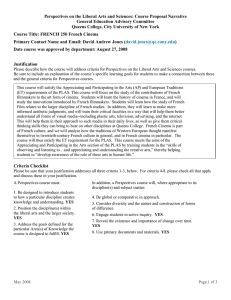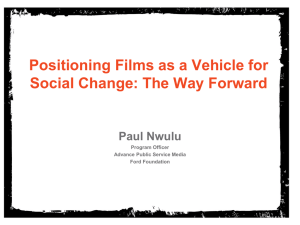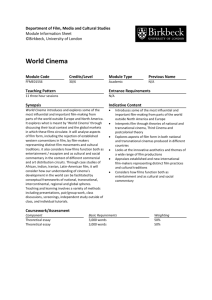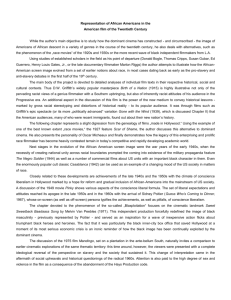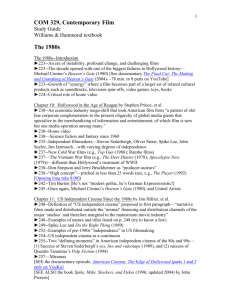QUEENS COLLEGE Department of European Languages and Literatures French 250W: French Cinema.
advertisement
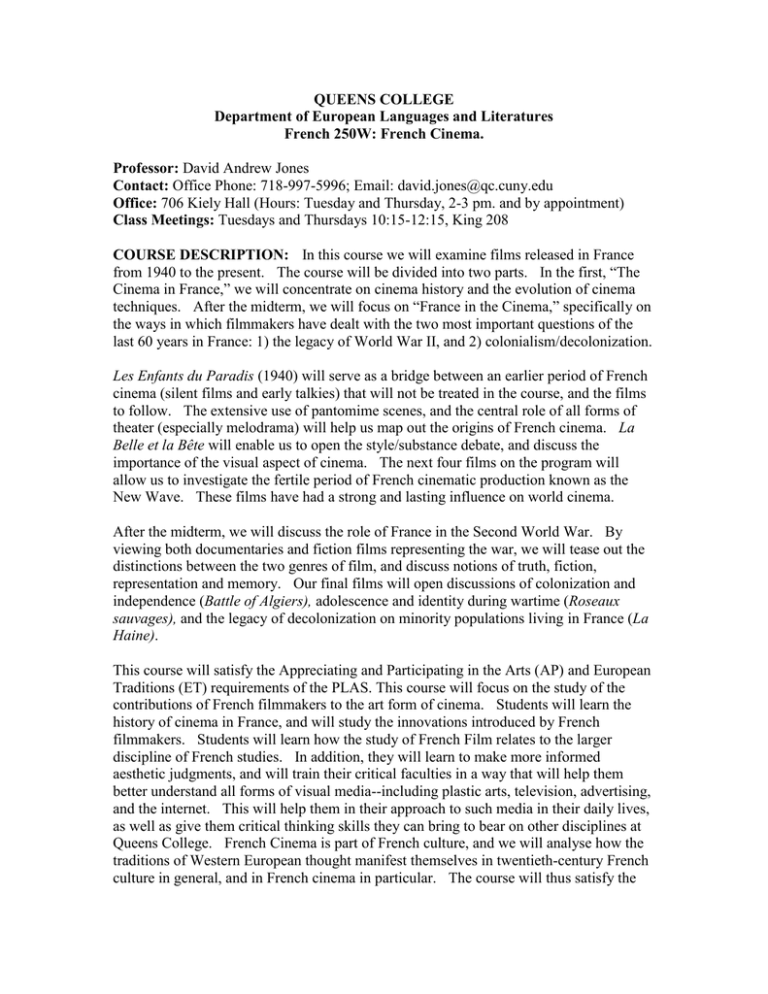
QUEENS COLLEGE Department of European Languages and Literatures French 250W: French Cinema. Professor: David Andrew Jones Contact: Office Phone: 718-997-5996; Email: david.jones@qc.cuny.edu Office: 706 Kiely Hall (Hours: Tuesday and Thursday, 2-3 pm. and by appointment) Class Meetings: Tuesdays and Thursdays 10:15-12:15, King 208 COURSE DESCRIPTION: In this course we will examine films released in France from 1940 to the present. The course will be divided into two parts. In the first, “The Cinema in France,” we will concentrate on cinema history and the evolution of cinema techniques. After the midterm, we will focus on “France in the Cinema,” specifically on the ways in which filmmakers have dealt with the two most important questions of the last 60 years in France: 1) the legacy of World War II, and 2) colonialism/decolonization. Les Enfants du Paradis (1940) will serve as a bridge between an earlier period of French cinema (silent films and early talkies) that will not be treated in the course, and the films to follow. The extensive use of pantomime scenes, and the central role of all forms of theater (especially melodrama) will help us map out the origins of French cinema. La Belle et la Bête will enable us to open the style/substance debate, and discuss the importance of the visual aspect of cinema. The next four films on the program will allow us to investigate the fertile period of French cinematic production known as the New Wave. These films have had a strong and lasting influence on world cinema. After the midterm, we will discuss the role of France in the Second World War. By viewing both documentaries and fiction films representing the war, we will tease out the distinctions between the two genres of film, and discuss notions of truth, fiction, representation and memory. Our final films will open discussions of colonization and independence (Battle of Algiers), adolescence and identity during wartime (Roseaux sauvages), and the legacy of decolonization on minority populations living in France (La Haine). This course will satisfy the Appreciating and Participating in the Arts (AP) and European Traditions (ET) requirements of the PLAS. This course will focus on the study of the contributions of French filmmakers to the art form of cinema. Students will learn the history of cinema in France, and will study the innovations introduced by French filmmakers. Students will learn how the study of French Film relates to the larger discipline of French studies. In addition, they will learn to make more informed aesthetic judgments, and will train their critical faculties in a way that will help them better understand all forms of visual media--including plastic arts, television, advertising, and the internet. This will help them in their approach to such media in their daily lives, as well as give them critical thinking skills they can bring to bear on other disciplines at Queens College. French Cinema is part of French culture, and we will analyse how the traditions of Western European thought manifest themselves in twentieth-century French culture in general, and in French cinema in particular. The course will thus satisfy the ET requirement for the PLAS. This course meets the aims of the Appreciating and Participating in the Arts section of the PLAS by training students in the “skills of observing and listening to…and appreciating and understanding the creative arts,” thereby helping students to “develop awareness of the role of these arts in human life.” WRITTEN WORK: This is a writing-intensive course, which means that you must produce 15 pages of writing during the semester. You will write three papers for the course—a first paper on Cocteau’s La Belle et la Bête, which will be rewritten, a second on WW II in film, and a third commenting on how this course has helped you sharpen your critical faculties, and how it might have altered your approach to all forms of visual media. To help you prepare for this final paper, you will keep a journal throughout the semester in which, for each film, you write your reactions, and describe how a given film has changed your perception of cinema. PARTICIPATION: One of the goals of this course is to help you discuss the art of film more intelligently. Therefore, your participation in class discussions is important. You will receive a class participation grade every day; if you do not come to class, you will receive a zero. If you arrive late, your grade will be lowered proportionately to your tardiness. Your two lowest participation grades will be dropped, so you may miss two sessions without any penalty, but frequent absences will certainly have a negative effect on your participation grade. Any time you know you will miss class, you should notify me in advance. Grade Breakdown: First Paper with rewrite: 20% Second Paper: 20% Reading Journal and Third Paper: 20% Midterm: 15% Final Exam: 15% Participation: 10% A word on plagiarism: Unfortunately, with the rise of the internet, cheating on written assignments has reached epidemic proportions on US college campuses. You may not copy anything, ever, word for word, in whole or in part, and represent this as your own work. Generally, you will not be required to do outside research for this course. If you quote from any source in your work, you must clearly indicate the source according to the guidelines of the MLA style manual. We will review citation procedures in class. When faced with a deadline, you may be tempted to use the work of others rather than create your own. Do not do this! The consequences are severe, and include the possibility of expulsion from the College. Please remember that the goals of this course are defeated if you do not do your own work. SYLLABUS Part 1: The Cinema in France August 28, 30: Les Enfants du paradis. Introduction to the course. September 4, 6: La Belle et la bête. Before class: Read La Belle et la bête (photocopy). September 11, 20: Les 400 coups. First paper due Sept. 20 (see description below). September 25, 27: A Bout de souffle. October 2, 4: Cléo de 5 à 7. First paper returned Oct. 4. October 9, 11: L’Année dernière à Marienbad. Rewrite of First Paper due Oct. 11. October 16: Midterm Examination. Part 2: France in the Cinema A. WWII October 18, 23, 25: Le Chagrin et la pitié. October 30-November 1: Shoah November 6, 8: Au Revoir les enfants November 13, 15: Hiroshima, mon amour. Begin work on second paper. B. Colonialism/Postcolonialism November 20, 27: Bataille d’Algers November 29, December 4: Les Roseaux Sauvages Paper 2 due Nov. 29. December 6,11 La Haine. Third paper due Dec. 11. Final Examination: Date and location TBA. First Paper: 3-5 pages. I will distribute to you the version of La Belle et la bête by Jeanne-Marie LePrince de Beaumont, which inspired the Cocteau film. Read it, then write an essay on 1) your personal “reading” of this folk/fairy tale; 2) the ways in which Cocteau’s film is faithful to it; 3) the ways in which Cocteau’s film is not faithful to it; 4) the ways in which, in your opinion, Cocteau’s visual style is (or is not) appropriate to the story. This essay will be returned for a rewrite. Second Paper: 6-8 pages. Compare and contrast representations of WWII in Film—choose 2 films and write about their representation of the conflict. Possible topics 1) the similarities and/or differences in depiction between documentary and “fiction” film; 2) differences in representation in films of the same genre (Shoah vs. Le Chagrin et la pitié or Hiroshima mon amour vs. Au Revoir les enfants). Third Paper: 3-5 pages. Describe how this course has helped you to sharpen your critical faculties, and how it has altered your approach to other visual media. In your paper, you will cite your interpretations of some of the films we have watched this semester to support your statements. The goal of this paper is to help you identify the skills you have learned in this course that you may apply to your studies in other areas of the college, and in interpreting the world around you.
